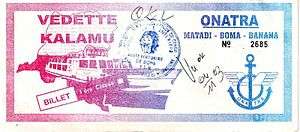Office National des Transports (Congo)
The National Office of Transport (French: Office National des Transports, or ONATRA) is a publicly owned company based in Kinshasa which operates railways, ports, and river transport in the north and west of the Democratic Republic of the Congo on the Congo River. It is the continuation of the Office of Colonial Transport (Office des transports coloniaux, OTRACO) founded in 1935 and has subsequently existed under other names.

.jpg)
History
The 'Office des transports coloniaux (or "Colonial transport agency, OTRACO) was established, in 1935, as a public body, and renamed the Office des transports au Congo (OTRACO) in 1960, finally becoming the "Office National des Transports" (ONATRA) in 1971.
In 1973, ONATRA carried its largest number of passengers ever, a total of 410,871.
In 1977, the government decided to end ONATRA's monopoly of river transport, and to allow any individual or company to own and operate river boats.
Decline in the state of its assets, together with competition, led to a sharp decline, so that by 1982, it only carried 121,779 passengers.
Network

The network includes:
Timeline
2008
- New locomotives